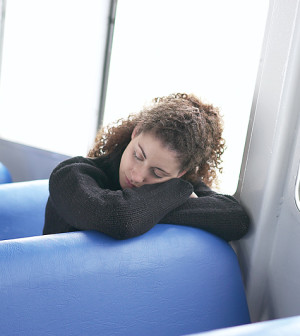- Could Your Grocery Store Meat Be Causing Recurring UTIs?
- Are You Making This Expensive Thermostat Error This Winter?
- Recognizing the Signs of Hypothyroidism
- 10 Strategies to Overcome Insomnia
- Could Artificial Sweeteners Be Aging the Brain Faster?
- Techniques for Soothing Your Nervous System
- Does the Water in Your House Smell Funny? Here’s Why
- Can a Daily Dose of Apple Cider Vinegar Actually Aid Weight Loss?
- 6 Health Beverages That Can Actually Spike Your Blood Sugar
- Treatment Options for Social Anxiety Disorder
A Good Night’s Sleep May Mean a Good Day’s Work


Getting enough sleep each night may mean you’re less likely to take time off from work due to illness, a new study suggests.
The study included more than 3,700 people in Finland, aged 30 to 64, who were followed for an average of seven years.
Those who slept less than six hours or more than nine hours a night were much more likely to have extended absences from work due to illness, the investigators found. People with the lowest risk for taking time off from work due to sickness were those who slept between seven and eight hours a night.
The researchers even narrowed the ideal amount of nightly sleep for workers down to seven hours, 38 minutes for women, and seven hours, 46 minutes for men, according to the study in the September issue of the journal Sleep.
The team also found that insomnia-related symptoms — waking early in the morning, feeling more tired than others and using sleeping pills — were all linked with a significant increase in time off from work due to illness.
“Optimal sleep duration should be promoted, as very long and very short sleep indicate health problems and subsequent sickness absence,” principal investigator Tea Lallukka, a specialized researcher at the Finnish Institute of Occupational Health, said in a journal news release.
“Those sleeping five hours or less, or 10 hours or more, were absent from work every year for 4.6 to 8.9 days more, as compared to those with the optimal sleep length,” Lallukka added.
The researchers calculated that the direct costs of sickness-related work absences to the Finnish government and businesses could be cut by up to 28 percent if employees’ sleep problems could be solved.
“Insomnia symptoms should be detected early to help prevent sickness absence and deterioration in health, well-being and functioning,” Lallukka said. “Successful prevention of insomnia not only promotes health and work ability among employees, but it can also lead to notable savings in reduced sickness absence costs.”
However, the association seen in the study does not prove that there is a cause-and-effect relationship between sleep duration and sick days.
More information
The U.S. Centers for Disease Control and Prevention has more about sleep.
Source: HealthDay
Copyright © 2026 HealthDay. All rights reserved.










